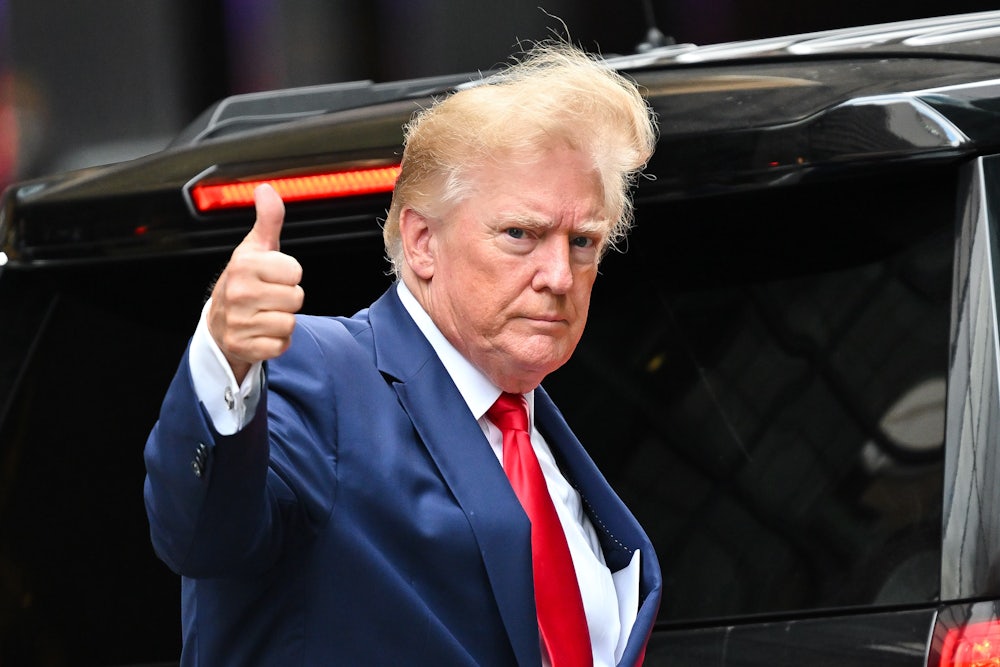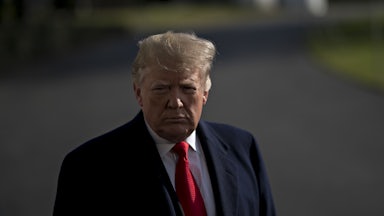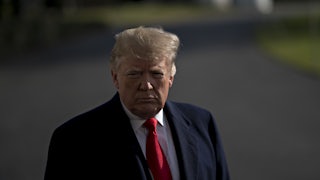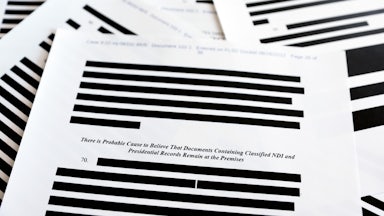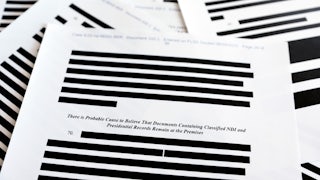This week, the Department of Justice released photographs of highly sensitive, top secret documents that were recovered during the FBI’s raid of Mar-a-Lago last month. If it’s true that a picture speaks a thousand words, then some of those words, in this instance, were, “Wow it sure looks like Trump committed a serious crime,” and, “If this was any other person, they’d likely be indicted right now, if not down a deep, dark hole.” But Trump is not “any other person”: As a once and (he hopes) future head of state, he’s being treated with a lot more deference than most suspects. He’s also unlike other people in another way: He seems bent on personally decimating his own defense, with the help of his allies.
Since the DOJ executed its search warrant, there has been little doubt that this was a more serious matter than most other Trump peccadilloes. But throughout his political career—and business career, for that matter—Trump successfully skirted danger, often on some very flimsy premises. When impeached the first time for trying to withhold military aid to Ukraine in exchange for dirt on Joe Biden—a scandal that only looks worse with every passing week of Russia’s invasion—he and Republicans hung on to a sliver of ambiguity, arguing that there was never an explicit quid pro quo. When impeached a second time—this time for inciting a riot that nearly killed members of Congress—they followed more or less the same strategy. Sure, Trump implored his followers to “fight like hell.” But he didn’t mean it literally. In fact he meant the opposite.
There is no sliver of ambiguity now. The photographs released by the Justice Department on Tuesday are the equivalent of the quintessential “drugs on the table” pictures associated with narcotics busts. The FBI went to Mar-a-Lago and found hundreds of pages of documents clearly marked “top secret.” Donald Trump, a private citizen, is not allowed to have those documents. Not only that, his lawyers lied to the Feds. For the first time in his postpresidency, it now seems more likely than not that he will be prosecuted. Trump is currently benefiting from the DOJ’s quasi-official directive not to indict a political figure within 90 days of an election. But it would not be surprising to see an indictment come the early winter. Trump is screwed. But so are the Republicans who have insisted that there was nothing to see here.
For weeks, Trump has rotated through a variety of implausible explanations for why he was hanging on to these materials: First the documents were fake; later, although they were fake, he had declassified them anyway. With few exceptions, Republicans initially jumped into the fray in Trump’s defense, perhaps understandably considering he’d historically wriggled his way out of each and every jam. Trump’s defenders argued that the DOJ and its leader, Merrick Garland, were acting like the Gestapo; that this was a sign that the United States had become a banana republic. House Minority Leader Kevin McCarthy promised retaliation against Garland; others threatened to investigate Biden and his family when they retook power. (As if they aren’t already planning to do this.) Some issued calls to defund the FBI—an organization that, in their view, needed to be purged.
This response was almost autonomic: like watching the leg of a dead frog kick when an electric current runs through its corpse. Over the last seven years, there has only been one ironclad rule of GOP politics: The only excommunicable sin is to go against Donald Trump. And so Republicans reflexively backed him to the hilt—forgetting, as my colleague Matt Ford argued last month, that the smarter move is always to anticipate that something worse is coming.
They’d also forgotten that Trump had previously escaped political accountability in large part because they refused to push him out of office after he committed obviously impeachable acts. That Trump had thus far avoided legal accountability is down to the fact that he was holding office as president of the United States. This is no longer the case. Trump no longer has the option of sheltering behind the ambiguous shield of executive privilege. It seems like he understands that: He has invoked the possibility of a 2024 run in recent weeks, acknowledging that as a candidate for president, he’d be edging back into a gray area as far as the long arm of the law is concerned.
But he’s also behaving like a person who has committed a crime. And he’d be in the position to know. By Wednesday, Trump was grasping after straws, all but admitting that he had possessed documents illegally.
Trump has moved off suggesting things were planted and now says documents were “in cartons” at his house/club…which he says even though his lawyer signed a document asserting all material was in the storage area and went back, per DOJ pic.twitter.com/J3ANADC5rq
— Maggie Haberman (@maggieNYT) August 31, 2022
This is a classic Trump post. He’s so clearly incensed by the messy aesthetics—hence his insistence that the documents had been kept in “cartons”—that he can’t just keep his mouth shut. Staged photos, as many have pointed out, are standard procedure in busts. Trump is, at long last, being treated like a criminal; the kid gloves are off.
In a 36-page filing released on Tuesday, the DOJ swatted away Trump’s flimsy defenses. The DOJ made it apparent that the former president’s attorneys had lied to it when they insisted that all classified documents had been returned and stated that Trump “lacks standing to seek judicial relief or oversight as to presidential records because those records do not belong to him.” As Slate’s Dahlia Lithwick noted, this means that “he cannot claim that the stolen documents belong to him, as they were stolen.” (This shouldn’t be that hard to understand, but Trump’s legal team, in its defense, has been specifically hired to misunderstand this.)
Trump’s near admission of guilt is actually one of the more normal things he’s posted on Truth Social lately. The lion’s share of his social media utterances are the work of a man who is—say it with me now!—“increasingly isolated.” Left to his own devices, the president has spent his days raving. He has argued that he should be immediately made president (or that there should be a new election) because, in his view, the media failed to adequately cover the Hunter Biden laptop story. He spent a large portion of one day reposting the work of QAnon propaganda accounts and amplifying conspiracy theories about the FBI. Meanwhile, most of his Republican enablers have belatedly learned their lesson and gone silent on the Mar-A-Lago matter, pointedly returning their focus to other issues—immigration, inflation, and crime—related to the upcoming midterm elections.
They won’t be able to hide forever, however. Trump seems to be growing more deranged by the day; as we enter the homestretch of the midterms, he’ll be back out on the campaign trail and will likely use whatever venue he’s given to focus attention on himself—ranting about this latest injustice and demanding that Republicans stand behind him or feel the wrath of his fan base—instead of promoting the candidates running for office. His exile from Twitter has kept his more unhinged statements from getting as much traction as they used to, but this too will likely change: The midterms, further January 6 hearings, and his expected entry into the 2024 presidential election all mean that more media coverage is coming; his pending indictment means that much of what he has to say will get pulled into the Mar-a-Lago feedback loop as the clock ticks down on the DOJ’s 90-day no-go window. The meltdown in MAGAland is on, and for Republicans, it could not have come at a worse moment.
